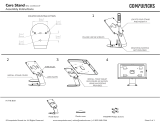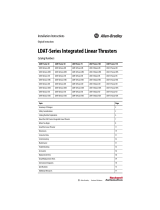Installation Guide Linear Motors DE
Seite 2 / 51 P10-70 / P10-70-Dxx NTI AG / LinMot
Content
1 General information ................................................................................................................................. 4
1.1 Introduction ........................................................................................................................................ 4
1.2 Explanation of symbols ...................................................................................................................... 4
1.3 Qualified personnel ............................................................................................................................ 4
1.4 Liability ............................................................................................................................................... 4
1.5 Copyright............................................................................................................................................ 4
2 Safety instructions ................................................................................................................................... 5
3 Installation instructions ........................................................................................................................... 7
3.1 Operating conditions .......................................................................................................................... 7
3.2 Instructions for installing the linear motor .......................................................................................... 7
3.3 Mounting the stator ............................................................................................................................ 8
3.4 Mounting the payload to the slider ..................................................................................................... 8
3.5 "Moving slider" installation ............................................................................................................... 10
3.6 "Moving stator" installation ............................................................................................................... 10
3.6.1 Assembling instruction ................................................................................................................. 11
3.7 Minimum distance from slider .......................................................................................................... 12
3.7.1 Minimum distance from slider to slider ........................................................................................ 12
3.7.2 Minimum distance from slider to metallic parts ............................................................................ 13
4 Stroke Range .......................................................................................................................................... 13
5 Fluid cooling ........................................................................................................................................... 14
5.1 Design of water cooling ................................................................................................................... 14
5.1.1 Determination of the max. possible amount of cont. power dissipation Pv_Max ........................ 14
5.1.2 Determination of water flow Q ..................................................................................................... 15
5.1.3 Determination of water pressure p ........................................................................................... 15
5.2 Corrosion Protection ........................................................................................................................ 16
6 Electrical Connection ............................................................................................................................. 16
6.1 Technical Data of Motor Cables ...................................................................................................... 16
6.2 Stator connector assignment ........................................................................................................... 17
6.2.1 Power Connector ......................................................................................................................... 17
6.2.2 Encoder Connector ...................................................................................................................... 18
6.3 Attaching the cable shielding .......................................................................................................... 20
6.4 Rotatability of motor connectors ...................................................................................................... 20
7 Accessories ............................................................................................................................................ 22
7.1 Motor Cables for use with LinMot Drives ......................................................................................... 22
7.2 Motor Cables for use with third-party Drives ................................................................................... 23
7.3 Wiper with exchangeable end pieces .............................................................................................. 25
7.4 Wiper with lubricant depot ............................................................................................................... 26
7.5 Bearing kit with exchangeable end pieces ...................................................................................... 27
7.5.1 Overview ...................................................................................................................................... 27
7.5.2 Mounting ...................................................................................................................................... 28
7.6 Bearing kit with lubricant depot ........................................................................................................ 29
7.6.1 Overview ...................................................................................................................................... 29























